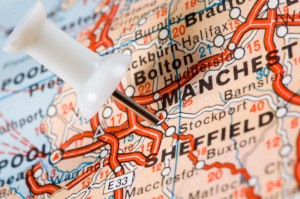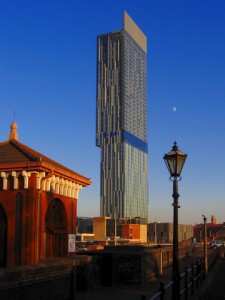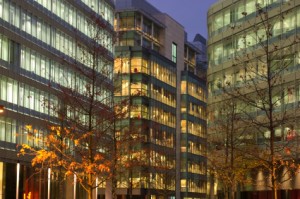
[Updated January 2024] A guide to serviced offices and office space to rent in Manchester as well as general information that may be useful if you are thinking of renting office space in the city.
For further office information or to search office spaces for rent in Manchester just click. Or contact us for any other query.
History & Geography
Manchester is located in the North West of England, bordered by the mountains of the Pennines and the Cheshire Plain. Manchester lies on the east bank of the River Irwell and was first inhabited by the powerful Brigante tribe. However, the city only became a permanent settlement when the Romans invaded Britain and established a large fort in the area in 79 CE called Mamucium. The Romans abandoned the area in the 4th century, though the civilian settlement which had sprung up around the fort continued. After the invasion of England by the Normans in 1066 much of the area was laid waste during the Harrying of the North, with the ultimate death toll reaching the hundreds of thousands. However, Manchester survived and continued to grow in population and soon became a prosperous market town. The influx of Flemish weavers to the area in the 14th century transformed Manchester into the regional hub of the textile industry and the city became known for its woollen and linen articles. During the Industrial Revolution Manchester became the world’s most productive cotton processing centre and developed a host of other industries alongside it. Soon Manchester became known as the greatest industrial city in the world and continued to expand rapidly. When the Manchester Ship Canal was built in 1894 it allowed ocean-going to ships to sail right into the Port of Manchester. The last quarter of the 19th century and the beginning of the 20th was a golden era for the city and the phrase was coined, ‘what Manchester does today the rest of the world does tomorrow’. However, the latter half of the 20th century saw the city’s fortunes decline, with the heavy industry facing a massive downturn largely due to the economic policies of Conservative Party policies. Between 1961 and 1983, the city lost 150,000 manufacturing jobs. During the early 1990s, Manchester saw major regeneration efforts. Millions of pounds were given to the city to repair the destruction caused by an IRA bomb in 1996, which resulted in the transformation of the city centre, this was also further bolstered by the income and developments generated by the hosting of the 2002 Commonwealth Games. Today, Manchester is effectively England’s second city, a thriving economic hub and cultural icon.
Economy
Manchester’s economy is one of the largest in England and the city is a centre of the arts, media, commerce and higher education. Additionally, the city is a major legal and financial hub. A recent survey of business leaders in the UK ranked Manchester as the best place in the UK to locate a business and the 12th best in Europe. One of the city’s largest employers is the Co-operative Group, the world’s largest consumer-owned business. Spinningfields, the large business area west of Deansgate is currently being described as the Canary Wharf of the north and is home to the Royal Bank of Scotland’s headquarters. Construction is also an important industry in Manchester, and the city is currently the site of one of the largest new developments in the UK, NOMA. To be situated in the north of the city, NOMA is a 20-acre site of offices, leisure, retail and residential space. Along with its function as a centre of business, Manchester is also a popular destination for visitors from the rest of the UK and the world. The city’s tourist industry is a major source of revenue and Manchester is currently the second most visited city in England after London.

Tourism & Culture
Manchester is a cultural icon for the rest of the UK and the world, a status reflected in its thriving tourism industry. Much of the city’s fame is from its musical heritage. A long list of bands hails from Manchester, including Oasis, The Smiths, the Buzzcocks, The Fall, Joy Division and New Order. During the 1980s the city fostered a host of indie bands such as The Stone Roses, Happy Mondays and James. The ‘Madchester’ phenomenon also gave birth to the rave scene and the music that went alongside it. This legacy continues to this day and can be seen in the city’s still-thriving music scene and nightlife. Manchester has some of the best clubs in the country and areas such as the Northern Quarter and Canal Street, home to the city’s gay village, have an array of bars, clubs, pubs and restaurants. Also, the city’s ‘curry mile’ in Rusholme, is famous for its Asian restaurants. Manchester is of course also known for its association with perhaps the most famous football club in the world, Manchester United, and its stadium, Old Trafford, and is a magnet for aficionados of the sport, as is its cross-city rival, Manchester City. The city also has a wide variety of museums, including the Imperial War Museum North, the Museum of Science and Industry and the People’s History Museum.
Transportation
Manchester has one of the best transport infrastructures of any city in the UK. It is served by Manchester Airport, the busiest in the country outside London, serving flights to North America, the Caribbean, the Middle East, Africa and the rest of Europe. The airport is easily accessible by rail from Manchester Piccadilly station, the busiest in the UK outside London. The other main railway station in the city is Manchester Victoria. Manchester itself is served by an extensive bus network as well as the Manchester Metrolink, the largest tram system in the UK.

Manchester Office Space and Flexible WorkSpace Market
Take-up in Manchester in 2022 reached 1.1m sq ft, an increase of 7% on the previous year and coincided with city centre footfall increasing to reach pre-2020 levels.
In terms of leased offices, headline rents have been predicted to top £40 per square foot for prime Grade A space in the traditional central core by the end of 2023.
Grade B space in the same location is expected to reach £30 per square foot.
Grade A office space in Spinningfields is expected to reach £36.50 per square foot.
Grade A space in Ancoats and the Northern Quarter is expected to reach £32 per square foot with Grade B space achieving £25 per square foot.
In Piccadilly, Grade A space is expected to reach £33 per square foot and Grade B space to reach £30 per square foot.
In 2023, Manchester’s office space take-up fell just short of 1m square feet at 946,000 square feet.
This was lower than 2022’s figure and lower than the five- and 10-year average figures for the city due to a shortage of large deal completions.
The Machester Office Agents Forum (MOAF) advised that the 10 largest transactions completed in 2023 totalled 254,566 square feet compared to 408,921 square feet in 2022.
MOAF, however, was optimistic of a strong 2024 in terms of take-up due to several large requirements due to complete in the first half of the year.
Manchester has a mature flexible workspace market that offers private serviced offices, managed workspace options and coworking memberships for corporates and individuals from a variety of building types in locations including Spinningfields, the Northern Quarter, the traditional core around King Street, NOMA, Ancoats and Piccadilly.
There are over 30 flex space providers in Manchester and the profiles of each can be found in this here.
International serviced office providers such as Regus have flex space centres in Manchester, as do national operators such as Landmark, i2 Office and Orega, there are also several Manchester-based office providers, the largest of which being Bruntwood.
Many office providers offer a wide range of workspace options including co-working space, and there are also many providers that specialise in co-working space. SPACES operate in the city and international co-working space provider WeWork chose Manchester as its first UK location outside of the capital as a location in which to operate. The first of their co-working centres was in Spinningfields.
Check out this essential directory of resources for companies looking to open an office in Manchester here
Our office space search, advisory and acquisition services are FREE, always. Our Manchester office space brokers and agents are globally regulated by the Royal Institution of Chartered Surveyors (RICS) ensuring the highest standards of commercial property advice and service at all times.

The Office Providers is Regulated by the RICS
See our new Manchester Street Address Guides here